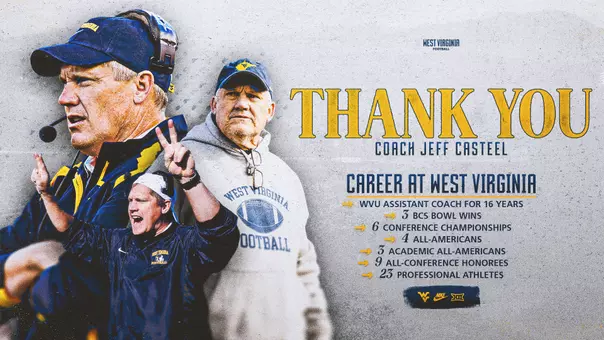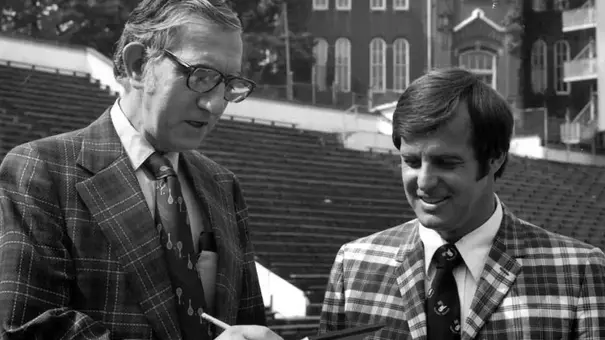Photo by: WVU Athletic Communications
Baker Outlines Multifaceted Football Scheduling Philosophy for Mountaineers
August 22, 2025 03:24 PM | Football
MORGANTOWN, W.Va. – West Virginia University vice president and director of athletics Wren Baker made his annual preseason visit with media inside the team room at Milan Puskar Stadium today.
Among the many topics he discussed was West Virginia's future football schedules and his desire to put together slates that are challenging and financially responsible, along with giving the Mountaineers the best opportunity to qualify for the College Football Playoffs.
All aspects must work in unison.
"We're looking at a lot of things when we are looking at our schedule," Baker explained. "We're trying to build a schedule that does allow us to sell tickets and create interest. We're trying to build a schedule that affords our team the best opportunity to have the kind of season they need to have to advance to the CFP; that's the end goal.
"But we're also trying to build a schedule that brings people to West Virginia and to Morgantown," he added. "I'm a huge believer that when you look at the economics of our state, and the opportunities to grow businesses in our state, tourism is one of, if not the biggest.
"I think any opportunity we have to have home games that can bring people to our state, fill up our hotel rooms, experience the beauty of fall here, and whether it's golfing, hiking, river rafting, fishing, side-by-siding, as I like to do on my free time, or whatever it is that you are doing, I think it's a responsibility of ours to try and promote tourism for the state."
Years ago, before Baker came on board as West Virginia's athletic director, the athletics department commissioned consulting company Tripp Umbach to determine the amount of direct dollars generated by Mountaineer home athletic events throughout the year.
For instance, if West Virginia is playing a home football game on Saturday and a family drives from Parkersburg to Morgantown and decides to stop and eat in Fairmont, that's direct economic impact.
When a TCU fan flies into Benedum Airport in Clarksburg, stays in a hotel in Bridgeport, and then travels to Morgantown on game day, that's direct economic impact.
When a Mountaineer fan travels from Charlotte to Morgantown and stops in Flatwoods for gas on the way, that's direct economic impact.
In the summer of 2018, when this study was completed, the total real dollars generated by West Virginia University athletic events was $302.7 million to the state, or roughly $400 million in today's dollars.
The economic impact on Monongalia County was $78.8 million then, or more than $100 million today. The total amount of visitor and fan spending for the academic year was estimated at $246.1 million then, or about $325 million today.
That's a lot of money!
Baker says local, regional and state leaders appreciate the real dollars Mountaineer athletics bring into the area each year.
Therefore, having a strong and successful athletic program benefits everyone.
"I know people who come in for some of our games and stay at Nemacolin (Resort)," he said. "That's not in-state, but it's in our region, and I think our games have an impact that stretches well beyond Morgantown or Monongalia County.
"I think people know. I think our board knows and I think our president knows. Throughout the state, they understand. I read an article recently that in terms of growth of tourism as part of the economy, I think (West Virginia) was like fourth or fifth in the entire country," he stated. "The ones that were ahead of us were big, big touristry (states). I am a believer that (tourism) is a massive opportunity for this state, and I'm not the first person (to mention this).
"There is a significant opportunity for us, but it's become a huge focal point for the state leadership. WVU athletics has a massive, massive impact on the economy in Morgantown, in our region and in our state," he observed.
Which means many different factors must be considered during the scheduling process and a lot is riding on those decisions.
"We have spent hours and hours and hours analyzing scheduling opportunities, and I think we have a pretty executable plan," he noted.
As for this year's slate, it will be the first time since 2017 that West Virginia doesn't have 11 power conference teams on its schedule.
In 2018, WVU had nonconference games scheduled against Tennessee in Charlotte and at NC State, but the game against the Wolfpack in Raleigh was canceled because of Hurricane Florence and was not rescheduled.
In 2020, the COVD-19 pandemic claimed games against Florida State in Atlanta and at home against Maryland.
From 2021 to 2024, West Virginia opened its season at Maryland in 2021, at Pitt in 2022, at Penn State in 2023 and at home against Penn State last year. The Mountaineers also faced power conference opponents at home against Virginia Tech in 2021, at Virginia Tech in 2022, at home against Pitt in 2023, and at Pitt last season.
Those schedules were simply too difficult for the Mountaineers to navigate, according to Baker.
"I'm not second-guessing or questioning anything that was done," he explained. "We moved into a league where we didn't have a lot of natural geographic rivals, and I think there was a desire to maintain some of those, and I think that's why some scheduling moves were made.
"I tend to be driven more by data, and the data clearly shows that the path to having success in this new era is 10 power conference games. That's the goal, and that's driving our philosophy more than others. I get stopped all the time with opinions about who we should play and when we should play them. 'We are West Virginia. We should play in our yard, their backyard or anybody's backyard anytime.' I'm like, 'That's great, but I follow the data and not bravado,'" Baker concluded.
Among the many topics he discussed was West Virginia's future football schedules and his desire to put together slates that are challenging and financially responsible, along with giving the Mountaineers the best opportunity to qualify for the College Football Playoffs.
All aspects must work in unison.
"We're looking at a lot of things when we are looking at our schedule," Baker explained. "We're trying to build a schedule that does allow us to sell tickets and create interest. We're trying to build a schedule that affords our team the best opportunity to have the kind of season they need to have to advance to the CFP; that's the end goal.
"But we're also trying to build a schedule that brings people to West Virginia and to Morgantown," he added. "I'm a huge believer that when you look at the economics of our state, and the opportunities to grow businesses in our state, tourism is one of, if not the biggest.
"I think any opportunity we have to have home games that can bring people to our state, fill up our hotel rooms, experience the beauty of fall here, and whether it's golfing, hiking, river rafting, fishing, side-by-siding, as I like to do on my free time, or whatever it is that you are doing, I think it's a responsibility of ours to try and promote tourism for the state."
Years ago, before Baker came on board as West Virginia's athletic director, the athletics department commissioned consulting company Tripp Umbach to determine the amount of direct dollars generated by Mountaineer home athletic events throughout the year.
For instance, if West Virginia is playing a home football game on Saturday and a family drives from Parkersburg to Morgantown and decides to stop and eat in Fairmont, that's direct economic impact.
When a TCU fan flies into Benedum Airport in Clarksburg, stays in a hotel in Bridgeport, and then travels to Morgantown on game day, that's direct economic impact.
When a Mountaineer fan travels from Charlotte to Morgantown and stops in Flatwoods for gas on the way, that's direct economic impact.
In the summer of 2018, when this study was completed, the total real dollars generated by West Virginia University athletic events was $302.7 million to the state, or roughly $400 million in today's dollars.
The economic impact on Monongalia County was $78.8 million then, or more than $100 million today. The total amount of visitor and fan spending for the academic year was estimated at $246.1 million then, or about $325 million today.
That's a lot of money!
Baker says local, regional and state leaders appreciate the real dollars Mountaineer athletics bring into the area each year.
Therefore, having a strong and successful athletic program benefits everyone.
"I know people who come in for some of our games and stay at Nemacolin (Resort)," he said. "That's not in-state, but it's in our region, and I think our games have an impact that stretches well beyond Morgantown or Monongalia County.
"I think people know. I think our board knows and I think our president knows. Throughout the state, they understand. I read an article recently that in terms of growth of tourism as part of the economy, I think (West Virginia) was like fourth or fifth in the entire country," he stated. "The ones that were ahead of us were big, big touristry (states). I am a believer that (tourism) is a massive opportunity for this state, and I'm not the first person (to mention this).
"There is a significant opportunity for us, but it's become a huge focal point for the state leadership. WVU athletics has a massive, massive impact on the economy in Morgantown, in our region and in our state," he observed.
Which means many different factors must be considered during the scheduling process and a lot is riding on those decisions.
"We have spent hours and hours and hours analyzing scheduling opportunities, and I think we have a pretty executable plan," he noted.
As for this year's slate, it will be the first time since 2017 that West Virginia doesn't have 11 power conference teams on its schedule.
In 2018, WVU had nonconference games scheduled against Tennessee in Charlotte and at NC State, but the game against the Wolfpack in Raleigh was canceled because of Hurricane Florence and was not rescheduled.
In 2020, the COVD-19 pandemic claimed games against Florida State in Atlanta and at home against Maryland.
From 2021 to 2024, West Virginia opened its season at Maryland in 2021, at Pitt in 2022, at Penn State in 2023 and at home against Penn State last year. The Mountaineers also faced power conference opponents at home against Virginia Tech in 2021, at Virginia Tech in 2022, at home against Pitt in 2023, and at Pitt last season.
Those schedules were simply too difficult for the Mountaineers to navigate, according to Baker.
"I'm not second-guessing or questioning anything that was done," he explained. "We moved into a league where we didn't have a lot of natural geographic rivals, and I think there was a desire to maintain some of those, and I think that's why some scheduling moves were made.
"I tend to be driven more by data, and the data clearly shows that the path to having success in this new era is 10 power conference games. That's the goal, and that's driving our philosophy more than others. I get stopped all the time with opinions about who we should play and when we should play them. 'We are West Virginia. We should play in our yard, their backyard or anybody's backyard anytime.' I'm like, 'That's great, but I follow the data and not bravado,'" Baker concluded.
Rich Rodriguez | Dec. 3
Wednesday, December 03
Reid Carrico | Nov. 29
Saturday, November 29
Jeff Weimer | Nov. 29
Saturday, November 29
Rich Rodriguez | Nov. 29
Saturday, November 29















